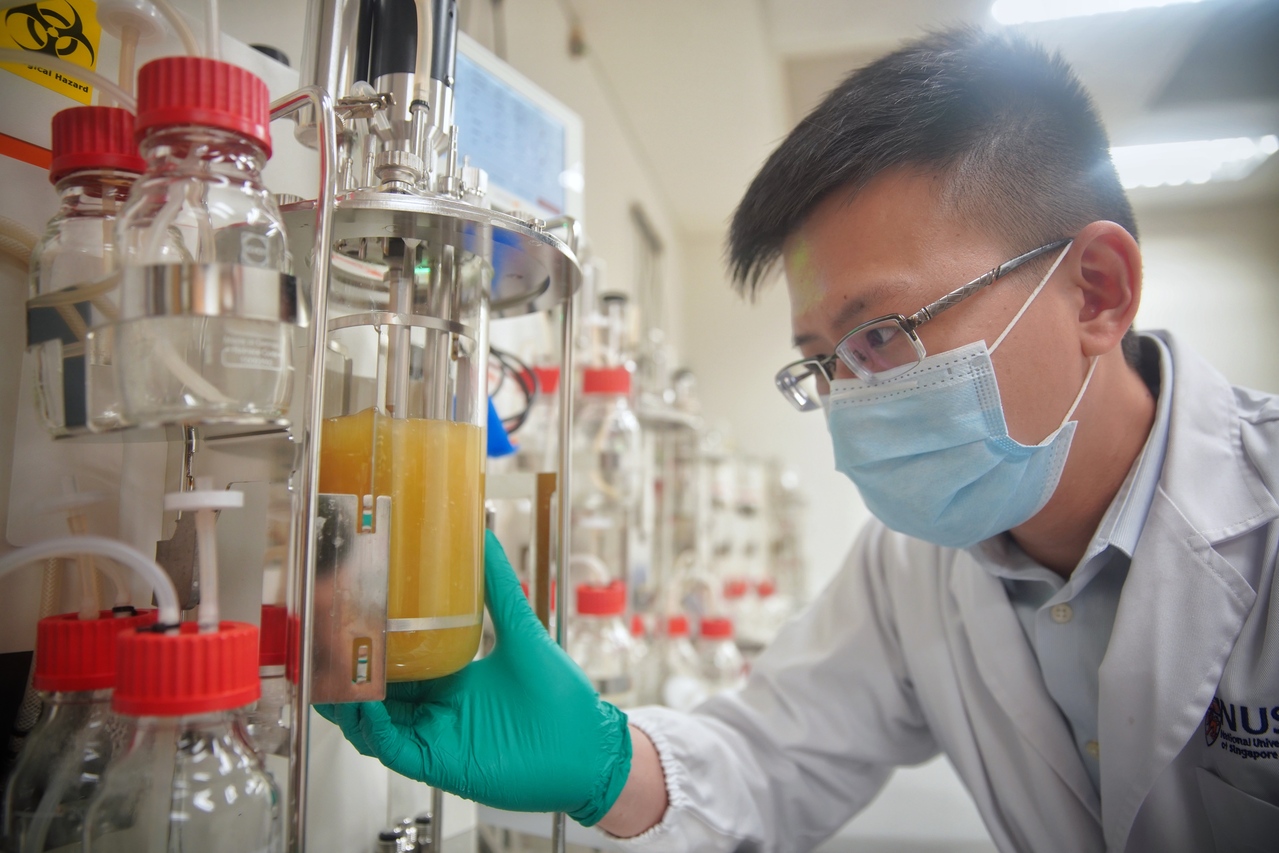Yeast may soon be key to making drugs for dementia and Parkinson's disease
Sign up now: Get ST's newsletters delivered to your inbox

Research Fellow Garrett Wong from the NUS Yong Loo Lin School of Medicine fermenting engineered yeast in a bioreactor.
ST PHOTO: JASON QUAH
Follow topic:
SINGAPORE - The yeast commonly used in baking and beer brewing may soon be a key to sustainably produce medication for dementia and Parkinson's disease.
Researchers from Singapore and Britain have found a way to modify the microscopic fungus and extract a key ingredient for such drugs.
The key ingredient is D-lysergic acid (DLA). It has a core structure similar to many neurotransmitters in the body, and therefore is used in drugs for treating dementia, Parkinson's disease, migraines and other neurological illnesses.
Traditionally, DLA is extracted from ergot, a parasite-like fungus that grows on cereal crops such as wheat and rye.
But ergot-infected crops are inedible, which means that cultivating ergot takes up agricultural land needed to grow food, said Associate Professor Yew Wen Shan from the National University of Singapore's Yong Loo Lin School of Medicine (NUS Medicine), and co-lead principal investigator of the yeast study.
Ergot cultivation is also heavily dependent on weather conditions, and the fungal disease can spread to food crops and poison cattle.
To extract DLA more sustainably, researchers from NUS Medicine and Imperial College London use DNA synthesisers to artificially create genes from the ergot fungus and then introduce them into yeast.
The modified yeast is then fermented with galactose, a milk sugar, which acts as food for the yeast to multiply.
Within a day or two of fermentation, the DLA is produced.
A one litre bioreactor of fermented yeast can produce between 1mg and 5mg of DLA, said Prof Yew, who is from the biochemistry department at NUS Medicine.
He is also the deputy director and research director of the NUS Medicine Synthetic Biology Translational Research Programme.
"Just like how baker's yeast has been used to produce the alcohol and flavours in beer... we are harnessing fungal cells to act as miniature factories to produce raw compounds for medicine," he added.
The team's research was published in scientific journal Nature Communications last month.

A fluorescence microscope image of baker’s yeast cells. PHOTO: NUS YONG LOO LIN SCHOOL OF MEDICINE
PHOTO: NUS Yong Loo Lin School of Medicine
If the DLA-making process is stepped up using a production-scale bioreactor, about five tonnes can be produced a year, said Prof Yew.
Globally, about 10 to 15 tonnes of DLA are needed annually to make drugs for neurological diseases.
The team is now working to optimise DLA production and hopes to scale it up within two years.
This is not the first time yeast has been used to make medicine components.
In the early 2000s, a professor from the United States found a way to extract from yeast a key ingredient for anti-malarial drug artemisinin.
In 2013, pharmaceutical company Sanofi launched the production of malaria drugs from the professor's discovery.
Prof Yew believes that if the DLA from yeast is commercialised, the price of its associated medications will be comparable to those currently made from ergot's DLA.

The team is now working to optimise DLA production and hopes to scale it up within two years. ST PHOTO: JASON QUAH
PHOTO: ST
He added that additional clinical trials may not be necessary for drugs made using DLA from yeast as it is identical to DLA from ergot.
Commenting on the recent research, Temasek Polytechnic's course chair of the diploma in pharmaceutical science, Dr Maisha Foo, said: "Since D-lysergic acid is an important ingredient from which many active pharmaceutical ingredients are derived, this will mean that the time and costs for manufacturing such drugs can be reduced.
"The quality of the finished products can also be assured with less batch to batch variation."
But she also raises questions about the new method.
"Are there any stability issues associated with the engineered strain of baker's yeast? How does the purity or efficacy of the DLA produced by the engineered strain compare with that produced by conventional methods?"
Responding to Dr Foo's question about stability issues, Prof Yew said: "There are no stability issues as the genes have been integrated into the genome of the the yeast."
The Singapore Association of Pharmaceutical Industries executive director Christina Teo said: "The pharmaceutical industry celebrates all innovative ways of producing critical medicines, provided they are rigorously tested, researched and peer reviewed to ensure patient safety and benefit."
Correction note: This article was edited to correct Christina Teo's name.

